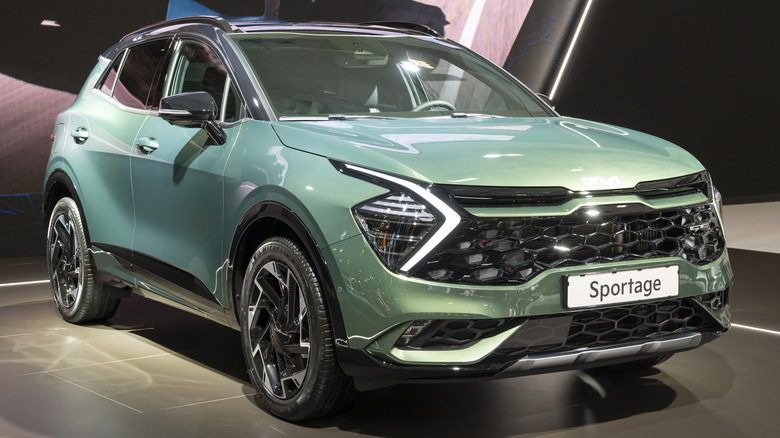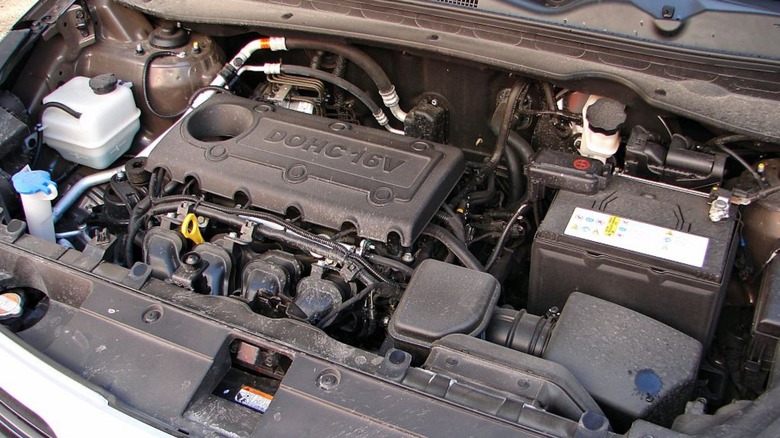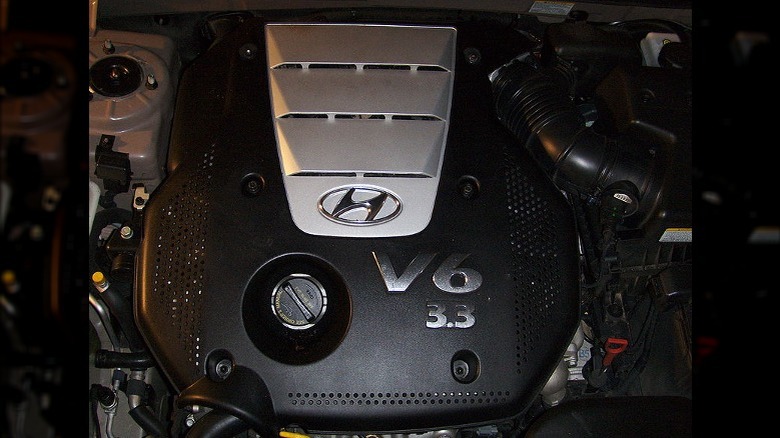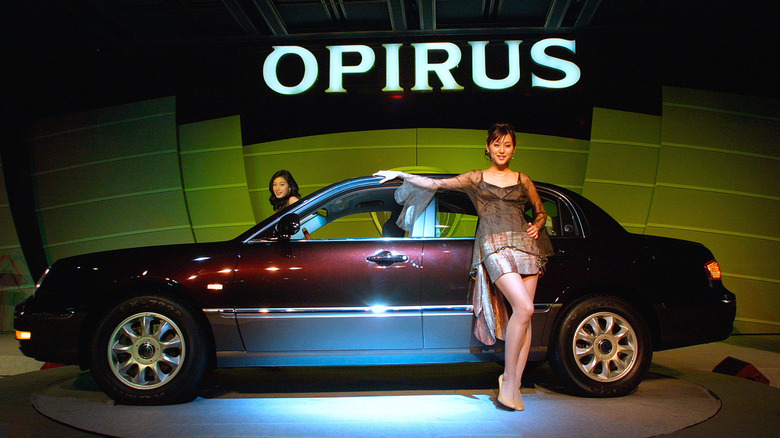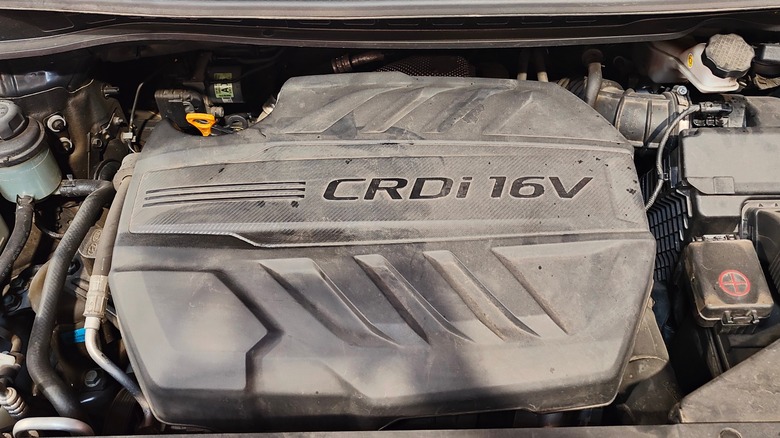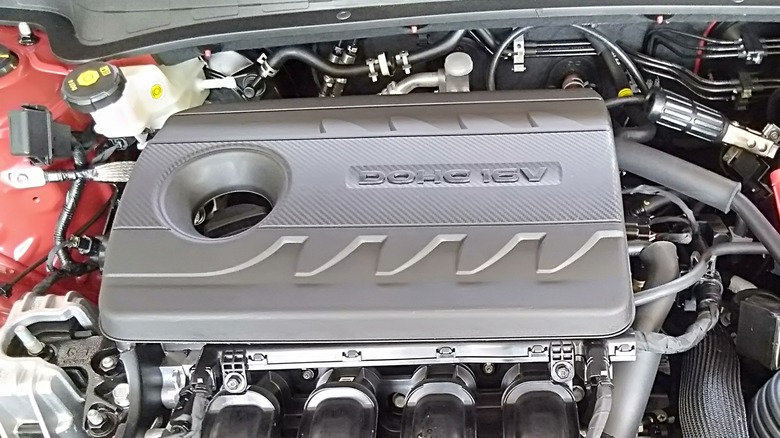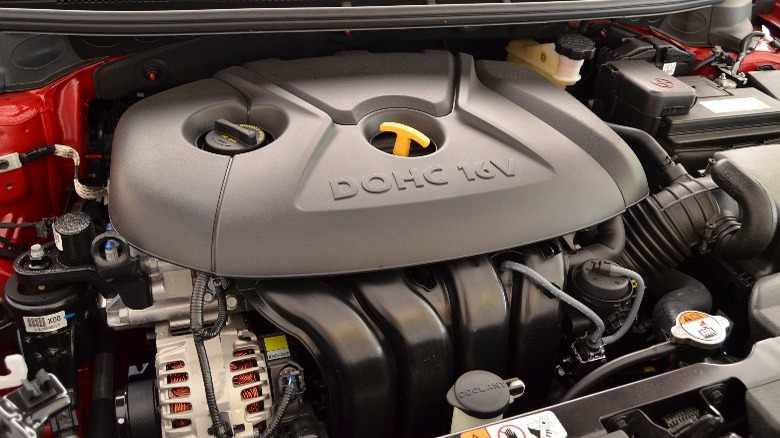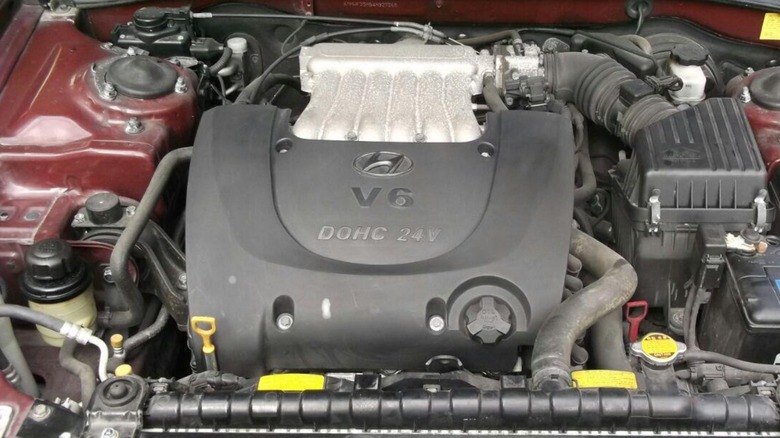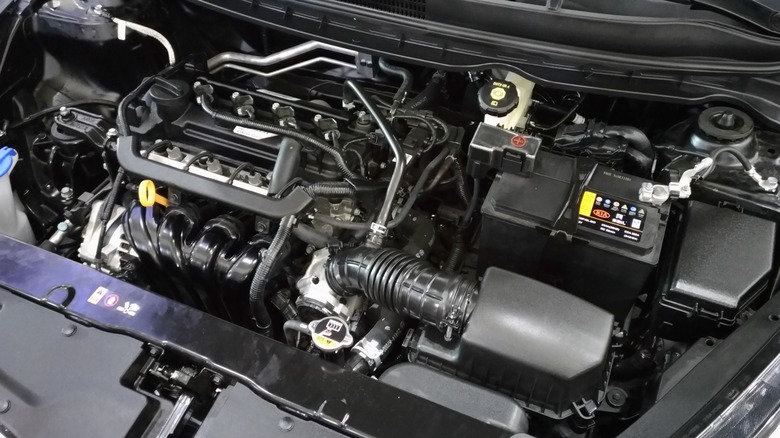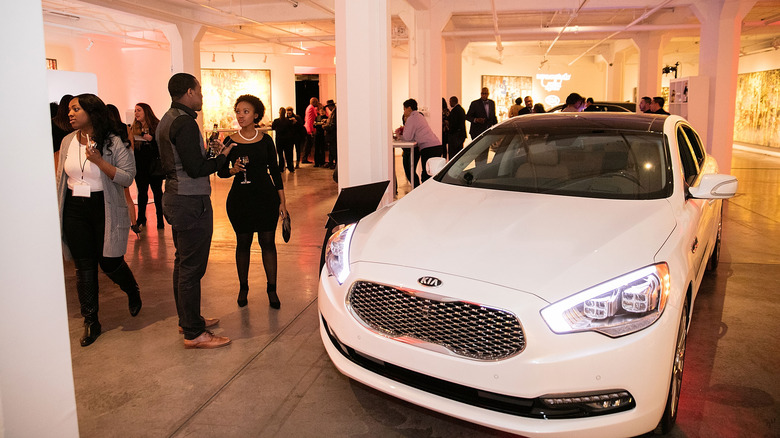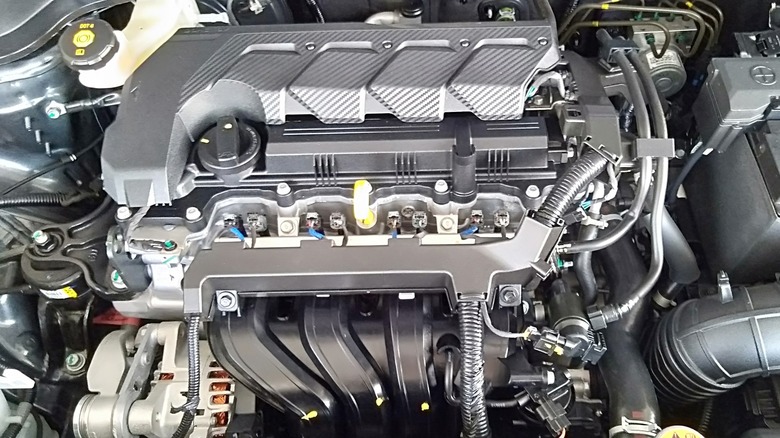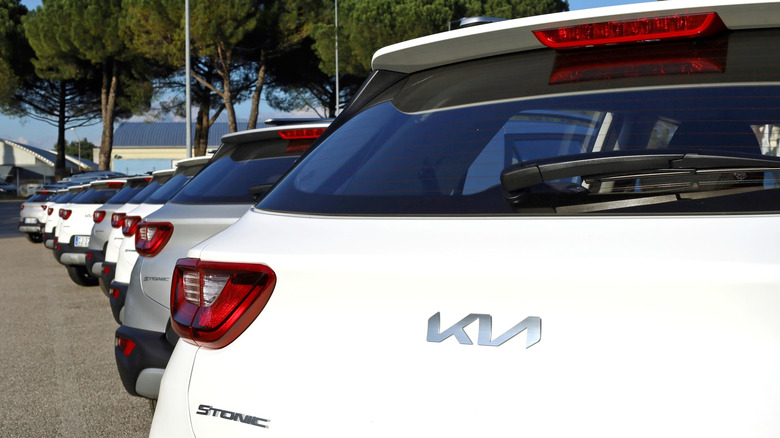10 Of The Most Reliable Kia Engines Ever Built
Kia offers consumers plenty of options, whether they're on a tight budget or able to spend as much money as they like. However, one major concern for any potential customer is how reliable these vehicles really are. While each car can be measured on its own, Kia uses multiple similar parts in their vehicles that could potentially cause similar points of failure due to design flaws. In these cases, perhaps the most notable part to look out for is the engine.
The relevancy of Kia engines is more important than one might think. After all, they aren't the only ones using them, as Kia and Hyundai actually share multiple different engine models amongst each other. A measurement of the most reliable Kia engines is able to apply to an entire other company, too. It's important to know which engines will perform the best under such pressure — and which ones couldn't keep up with time.
Theta 2.0L and 2.4L
The 2.0-liter and 2.4-liter Theta engines are among Kia's most well-known. They found their footing in 2004 when they were first released within Hyundai's Sonata lineup of cars. Since then, their presence in Kia vehicles has lasted nearly two decades, and they've managed to be part of some of the most reliable Kia models out there, including the Kia Optima and Kia Soul.
Unfortunately, the excitement around the 2.0L and 2.4L Theta engines soon soured. Variations of these engines across nearly an entire decade have been recalled over metallic debris damaging these engines' rod bearings, leading to over a million different vehicles being recalled. Even law firms have warned consumers to stay away from these engines, with ClassAction.org noting that multiple settlements have been reached over engine defects that can cause engine failures, seizures, and fires.
Despite this, not all 2.0L and 2.4L Theta engines should be condemned. More recent versions of these engines don't seem to share any of the same critical issues that caused this recall in the first place. Their long history has also led to a great deal of support from Kia, hopefully giving customers some confidence in being able to avoid future issues.
[Featured image by P199 via Wikimedia Commons | Cropped and scaled | CC BY-SA 1.0]
Lambda 3.3L
The 3.3-liter Lambda engines have been in use since 2005 inside both Hyundai and Kia vehicles. Some consumers are willing to swear by this engine type, while others lack much confidence. The engine has been featured in some fairly reliable cars, including the Kia Cadenza, so the engine is able to enjoy a pretty decent track record of no notable issues. However, more recent versions of these engines may be showing some problems.
Notable issues with these engines started to gain attention in 2023 when Auto Evolution reported that rising engine temperatures and potential fires led to a federal investigation of these engines. More recently, in 2024, Car Scoops reported that yet another investigation was started to determine if the engine suffered from seizing problems.
The models affected seem to primarily be from the years of 2016 and 2017, so it's possible that anyone buying newer cars won't have anything to worry about. Still, it would be careless to dismiss the issue entirely, especially considering how recent these investigations are.
[Featured image by Rogueagent71 via Wikimedia Commons | Cropped and scaled | Wikipedia Public Domain]
Sigma 3.5L
The Sigma 3.5L is one of the oldest engines in Kia's repertoire, although it was only available in Hyundai models for years after its debut in 1995. It wasn't until 2003 that it started appearing in Kia branded vehicles such as the Kia Opirus, allowing the engine to enjoy some brief time in the spotlight. However, these engines stopped being manufactured beyond 2006, meaning they're unlikely to be found in any modern vehicle today. Even beyond reliability concerns, this means any official support or information about these engines will be difficult for used car buyers to find.
The 3.5-liter variant is especially noteworthy. Those who owned Kia vehicles with this engine had mixed opinions on it. While some have found that it was subject to failures, others have reported driving models such as a 2004 Kia Amanti up to 200,000 miles, which is a testament to its ability to hold up over time. Of course, pretty much every car with this engine will be around two decades old, so there might be greater issues to worry about than the engine itself.
CRDi R 2.2L and D 2.0L
Though they've been in use since 2009, the CRDi R and D engines are better known for their use in Hyundai rides, with Kia only boasting the engine type in a handful of different models. These engines were primarily used in European markets as well, having specialized designs to comply with the country's emissions regulations. As such, there aren't many records of their performance in Kia vehicles, but those who were able to get the engine for themselves are generally positive about its performance.
The 2.2-liter version is of particular note thanks to reviewers such as CarMag praising its performance in vehicles like the Kia Stinger and Kia Sorento. In the case of the Sorento, the 2.2L R engine was even able to showcase impressive results during long-term stress tests. After months of heavy use, this engine was able to handle towing a 1.1-tonne trailer at a rate of 12 liters over 100 kilometers. As for the 2.0-liter D engine, Kia was proud to announce that at least one example in a 2007 Kia Sportage was able to reach one million kilometers without any need for a replacement.
While this engine type has suffered from a recall stemming from faulty parts back in 2017, it was one that affected a relatively low number of cars compared to previous items on this list. Discussions about the 2.2L R have praised its reliability, though some owners have noted issues regarding the earliest versions of the engine. The 2.0L D doesn't have as much discussion surrounding it, but reports on its performance remain positive in general.
Featured image by Iamjosemom via Wikimedia Commons | Cropped and scaled | CC BY-SA 4.0 |
Gamma 1.6L
Though most newer vehicles have moved on to Smartstream engines, variations of the older Gamma 1.6L are still found in modern Kia vehicles such as the Soul and the Seltos. Some Kia Soul have even reported examples of the engine reaching mileages up to 150,000. Considering its widespread use and consumer satisfaction, it's easy to see this engine type as an especially reliable choice.
This engine did end up suffering from a recall, being called out in the aforementioned Kia Soul models over issues of piston damage from high temperatures. However, this recall affected an especially low number of models — in fact, it only affected those with a Gasoline Direct Injection (GDI) setup. Direct Injection engines are infamous for requiring more maintenance due to issues like carbon buildup, so this is hardly a point against every 1.6L Gamma engine out there. The recall also only affects Soul models from 2012 to 2016, so models or years beyond this range likely won't have any comparable reliability issues.
[Featured image by AIMHO'S REBELLION 8490s via Wikimedia Commons | Cropped and scaled | CC BY-SA 4.0]
Nu 1.8L
The 1.8-liter Nu engines, which were first seen in 2011, found their most notable proof of reliability in Hyundai rides. Shortly after its introduction, one was used in a 2013 Hyundai Elantra that was able to reach over 1 million miles without any need for a replacement powertrain, an achievement highlighted by Hyundai in 2018. Notably, in 2020 a number of other Nu engines suffered from recalls related to fuel and oil leaking, but the Nu 1.8L managed to steer clear of those issues. Consumer reports paint a different story, however, leading to complaints stemming from the engine potentially locking up or making strange noises.
As for its use in Kia vehicles, the Nu 1.8L has seen fairly decent success. While consumers are only likely to find them in a handful of Kia Forte LX cars from 2014 to 2016, reviews for all of these models have been exceptionally positive. Despite the fact that plenty of Kias share engines with Hyundai, the Nu 1.8L seems to have found much greater average reliability in the former instead of the latter.
[Featured image by CapCase via Wikimedia Commons | Cropped and scaled | CC BY 2.0]
Delta 2.7L
The Delta 2.7L engine is similar to the Nu engines in that it is most commonly found in Hyundai vehicles rather than Kia models — a quirk that has remained true since its debut in 1998. However, vehicles that feature this engine such as the Santa Fe are among Hyundai's most reliable, and the well-rated 2005 Santa Fe happened to sport this type of engine as well. Only a few Kia models, including the 2004 and 2005 Kia Optima, have boasted this engine too, but these also have fairly good credibility from long-time owners.
General opinions on this engine and the cars running it appear to be positive overall, and the engine itself has no particularly notable history of any recalls or design flaws. Its limited production run means it might be tough to maintain on the off chance it happens to fail, and it does limit new owners to the used car market. 2.7L Delta engines are unlikely to be found in any cars dated beyond 2010. Still, the Delta 2.7L engine's comparatively trouble free track record makes it a potentially low-risk choice for buyers.
[Featured image by Hyeonminha via Wikimedia Commons | Cropped and scaled | CC0 1.0]
Kappa 1.0L and 1.4L
In contrast with some of the company's other engines, Kia's Kappa lineup has managed to mostly stay out of the limelight. This is in spite of the fact that the engines have still seen heavy use throughout recent years, with the Kia Rio sporting the 1.4-liter versions and the Kia Picanto offering the smaller 1.0L variant. Despite being released back in 2008, there simply isn't very much discussion about the engines themselves. Even so, seeing as how they're present in such widespread and reliable rides, Kappa engines are a fairly safe pick.
Of course, it should be noted that the Kia Rio has been recalled in the past. These recalls have affected over 3 million different cars across both Kia and Hyundai, so it's easy to assume that it's the fault of the engine. However, the issue stems more from an anti-lock brake module springing leaks, and the issue has occurred even in vehicles without Kappa engines. Overall, Kappa powertrains are among Kia's more reliable engine offerings.
[Featured image by Areaseven via Wikimedia Commons | Cropped and scaled | CC BY-SA 4.0]
Lambda 3.8L
Unlike its 3.3L counterpart, the Lambda 3.8L isn't currently embroiled in any investigations or lawsuits. In fact, National Oil and Lube News recently reported that the Lambda 3.8L avoided a major recall that involved engine oil leaks, which were found to be a result of poor maintenance work. The greatest downside of the engine is simply the fact that it doesn't see much use in modern Kia rides anymore, though it has found use in models like the K900 and Telluride. Luckily, despite the lack of Lambda 3.8L engines in more widespread models, the engine's reliability is extremely hard to beat.
The K900 is one of the most reliable Kia models to date, and even the oldest Telluride models are still holding up well even today. Of course, the Telluride debuted in 2019, so it doesn't have the same history of reliability as other Kia models, but it's still proven to be a high-quality model with a comparably high-quality engine.
Smartstream
Smartstream engines are some of the newest powertrains consumers can find in a Kia today, having only existed since 2018. While that does call their long-term reliability into question, this is really the only potential downside, as they've been proven to excel in many ways. Some of the most reliable Kia models of today boast this engine under their hood, including the Kia Sorento and Kia Ceed. As a newer model of engine, most cars sold with a Smartstream engine should still have full support from the manufacturer.
Practically every Smartstream engine — from the 1.6L and the 2.5L to the diesel and hybrid variants — has managed to make a good impression on buyers and reviewers. The modern-day Kia Sportage features this engine type, as well as updated models like the Kia Carnival and Kia K5. Only time will tell if these engines manage to stay as reliable as they seem, but their up-to-date designs and current results should make any consumer happy for a long time
[Featured image by AIMHO'S REBELLION 8490s via Wikimedia Commons | Cropped and scaled | CC BY-SA 4.0]
How we determined our list
Since many of these engines are available in cars from both Kia and Hyundai, this list uses a combination of metrics covering different models across different years. Ranking sites like iSeeCars, CarBuyer, and RepairPal are taken into consideration alongside reviews and discussions from consumers on social media. If certain engines are particularly popular or lack a wide range of public details or discussion, that's factored into our list, as well. Major recalls are also included in the rankings, as those are the greatest examples of an engine's reliability — or, rather, its unreliability.
As with any widely-manufactured item or component, every engine will be subject to its own quirks during production. Purchasing the most reliable engine can end up leading to a ride that falls apart in just a few miles, while taking a risk with the least reliable engines can lead to something that lasts a lifetime. Potential buyers should simply use these rankings as recommendations and not an outright guide to determine what they should get. After all, there's more to a car than what's under its hood.
